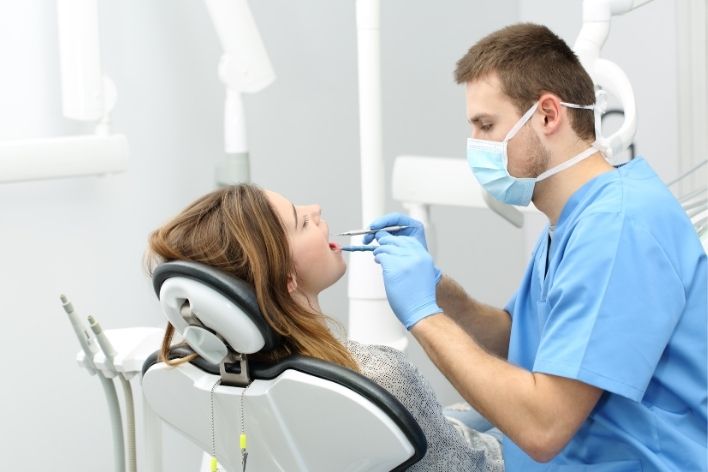Discover Rewarding Careers in Dentistry: Your Comprehensive Guide to the Dental Profession and Its Opportunities

Dentistry is a vital field in healthcare focused on preventing, diagnosing, and treating oral health issues. Careers in Dentistry contribute to the better health of the citizens. As a cornerstone of medical science, dentistry ensures the well-being of individuals' teeth and gums and contributes to overall health. In this article, we will delve into what it means to be a dentist, explore the roles and responsibilities within the field, and provide statistical insights into dentistry career prospects and earnings for dental professionals.
What is a Dentist?
In layman’s language, a Dentist is a Doctor of Teeth. To understand the profession of dentistry, it's crucial to first define what a dentist is. A dentist is a trained healthcare professional specializing in oral health, particularly the teeth, gums, and mouth. The role of a dentist encompasses a wide range of activities aimed at maintaining and improving oral health, diagnosing dental conditions, and providing treatment options.
The dentist's meaning extends beyond simple tooth care; it involves comprehensive knowledge of dental anatomy, oral diseases, and advanced treatment techniques. Dentists are responsible for performing various procedures, from routine cleanings and fillings to more complex surgeries and orthodontic treatments.
The Role of a Dentist
What does a dentist do? This question encompasses a broad spectrum of tasks and responsibilities that fall under the purview of dental professionals. Here’s an overview of the key functions:
1. Preventive Care:
Dentists emphasize the importance of preventive care to avoid common dental issues. This includes performing regular cleanings, applying sealants, and educating patients about proper oral hygiene practices.
2. Diagnosis:
Dentists diagnose oral health conditions through examinations, X-rays, and other diagnostic tools. They identify issues such as cavities, gum disease, and oral infections, determining the best course of treatment.
3. Treatment:
Treatment procedures performed by dentists include fillings for cavities, root canals for infected teeth, extractions, and crowns. They also manage more complex treatments like dental implants and orthodontic procedures.
4. Surgical Procedures:
Dentists may perform oral surgeries such as wisdom tooth extractions or corrective jaw surgeries. These procedures require advanced skills and knowledge of dental surgery techniques.
5. Patient Education:
Educating patients about oral health is a critical aspect of a dentist’s role. This includes advising on diet, oral hygiene practices, and preventive measures to maintain dental health.
6. Emergency Care:
Dentists often handle dental emergencies, such as severe toothaches or trauma to the mouth. They provide immediate care and develop treatment plans to address urgent issues.
Education and Training for Dentists
Making a career in Dentistry requires extensive education and training. Here’s a general path to becoming a dental professional:
1. Undergraduate Degree:
Aspiring dentists typically begin with a bachelor’s degree in a science-related field, such as biology or chemistry. This provides a solid foundation in the sciences necessary for dental school.
2. Dental School:
Following undergraduate studies, candidates must attend a dental school accredited by the American Dental Association (ADA) or equivalent bodies in other countries. Dental school usually lasts four years and culminates in a Doctor of Dental Medicine (DMD) or Doctor of Dental Surgery (DDS) degree.
3. Licensing:
After completing dental school, graduates must pass national and state or regional licensing exams to practice legally. Licensing requirements vary by location but generally include written and clinical exams.
4. Specialization (Optional):
Dentists may choose to pursue additional training in a specific area of dentistry, such as orthodontics, periodontics, or oral surgery. Specialization requires completing a residency program and additional certification.

The Dentist Profession: A Statistical Overview
Dentist meaning in terms of a career in Dentistry is quite significant, with many individuals pursuing this path due to its stability and demand. Here are some statistical insights into the field:
Number of Dental Professionals: In the United States alone, there are over 200,000 licensed dentists. According to the American Dental Association (ADA), the number of dental professionals is expected to grow as the demand for dental care continues to increase.
Job Outlook: The job outlook for dentists is positive, with a projected growth rate of 8% from 2021 to 2031, which is faster than the average for all occupations. This growth is driven by an increasing awareness of oral health and a growing population in need of dental care.
Dental School Enrollment: Approximately 10,000 students are enrolled in dental schools across the U.S. each year, with a steady number of graduates entering the profession annually. This reflects the ongoing interest and commitment to the field of dentistry.
|
Statistic |
Value |
Source |
|
|---|---|---|---|
|
Number of Dental Schools in India |
313 |
Dental Council of India |
|
|
Number of Dentists in India |
Approximately 1.2 lakhs |
Dental Council of India |
|
|
Annual Graduates from Dental Schools |
About 30,000 |
Dental Council of India |
|
|
Average Annual Salary for Dentists |
₹6,00,000 - ₹10,00,000 |
PayScale, Glassdoor |
|
|
Job Growth Rate (Dentists) |
20% increase over the next decade |
Indian Journal of Dental Research, Ministry of Health |
|
|
Percentage of Private Practice Dentists |
70% |
Dental Council of India |
Career Opportunities and Specializations
Dentistry offers various dentistry career paths and specializations. Here’s a brief overview of some common roles within the field:
1. General Dentist:
General dentists provide a wide range of dental services, including preventive, restorative, and emergency care. They are often the primary dental care providers for their patients.
2. Orthodontist:
Orthodontists specialize in diagnosing and correcting misaligned teeth and jaws. They use braces, aligners, and other devices to straighten teeth and improve bite function.
3. Periodontist:
Periodontists focus on the prevention, diagnosis, and treatment of gum disease and other conditions affecting the supporting structures of the teeth. They also perform dental implant placements.
4. Oral Surgeon:
Oral surgeons handle complex surgical procedures, such as the removal of impacted teeth, corrective jaw surgery, and treatment of oral cancers. They receive specialized training in surgical techniques.
5. Pediatric Dentist:
Pediatric dentists specialize in treating children’s dental needs, from infancy through adolescence. They address issues such as tooth development, cavities, and preventive care for young patients.
6. Endodontist:
Endodontists focus on treating the inside of teeth, particularly performing root canals and other procedures related to the tooth pulp. They manage complex cases of tooth infections and injuries.
7. Prosthodontist:
Prosthodontists specialize in restoring and replacing missing teeth using crowns, bridges, dentures, and implants. They work to improve both the function and appearance of patients' teeth.
8. Public Health Dentist:
Public health dentists work in community settings to promote oral health and prevent dental diseases on a larger scale. They may work with government agencies or non-profit organizations to improve access to dental care.
The Impact of Dentistry on Health and Society
The profession of dentistry plays a significant role in enhancing overall health and well-being. Dentists contribute to:
1. Preventing Oral Diseases:
By promoting preventive care and early intervention, dentists help prevent common oral diseases such as cavities and gum disease, which can have broader health implications.
2. Improving Quality of Life:
Dental treatments improve patients' ability to eat, speak, and smile confidently. Good oral health is closely linked to overall quality of life and self-esteem.
3. Supporting Systemic Health:
Oral health is connected to systemic health conditions such as heart disease and diabetes. Dentists can identify signs of these conditions and refer patients for further evaluation and treatment.
4. Educational Outreach:
Dentists play a crucial role in educating the public about the importance of oral hygiene and preventive care, helping to reduce the prevalence of dental issues and improve community health.
Conclusion
A career in dentistry offers a unique combination of scientific knowledge, technical skills, and patient interaction. What is a dentist? A dentist is a healthcare professional dedicated to maintaining and improving oral health, playing a crucial role in both preventive and restorative care. The dentist's meaning encompasses a broad range of responsibilities, from diagnosing and treating dental issues to educating patients about oral health. With a growing number of professionals entering the field and competitive salaries, dentistry remains a rewarding and impactful dentistry career choice. For those passionate about oral health and patient care, a career in dentistry presents both opportunities and challenges, contributing significantly to individual and public well-being.
FAQs About Careers in Dentistry
1. What qualifications are required to become a dentist?
To develop a career in dentistry, you need a bachelor's degree, followed by a Doctor of Dental Medicine (DMD) or Doctor of Dental Surgery (DDS) degree from an accredited dental school. Licensing exams are also required.
2. What does a dentist do daily?
Dentists perform various tasks including diagnosing and treating oral health issues, conducting preventive care, performing surgeries, and educating patients on maintaining oral hygiene.
3. How many years to become a dentist in India?
The duration of the undergraduate dental program is five years. The professional medical course has four years of academic study and one year of rotational internship. The UG program includes courses on dental hygiene, oral pathology, periodontics, orthodontics, pharmacology, and radiology.
We hope you enjoyed reading the above article. Please do not forget to share this blog with your friends and community members to spread awareness of "Careers in Dentistry”
Other Related Sections
NCERT Solutions | Sample Papers | CBSE SYLLABUS| Calculators | Converters | Stories For Kids | Poems for kids| Learning Concepts I Practice Worksheets I Formulas | Blogs
Admissions Open for 2025-26
CBSE Schools In Popular Cities
CBSE Schools in Bangalore
CBSE Schools in Mumbai
CBSE Schools in Pune
CBSE Schools in Hyderabad
CBSE Schools in Chennai
CBSE Schools in Gurgaon
CBSE Schools in Kolkata
CBSE Schools in Indore
CBSE Schools in Sonipat
CBSE Schools in Delhi
CBSE Schools in Rohtak
CBSE Schools in Bhopal
CBSE Schools in Aurangabad
CBSE Schools in Jabalpur
CBSE Schools in Jaipur
CBSE Schools in Jodhpur
CBSE Schools in Nagpur
CBSE Schools in Ahmednagar
CBSE School In Tumkur

